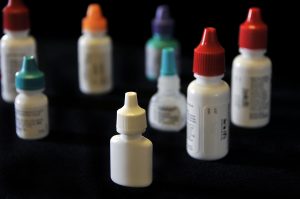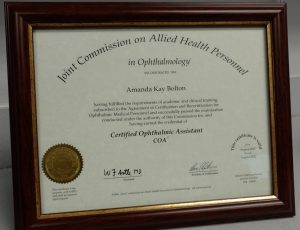Why So Many Drops?
DROPS, DROPS, when does it stop?

Ocular medication for dilating and glaucoma, assorted types
Patients often ask when they come in to see Dr. Moran for a complete exam, diabetic exam or cataract recheck, “Why all these drops?” Here is the simple explanation.

The eye doctor is easier than the dentist!
Getting a comprehensive eye exam without dilation, is like going to the dentist and not opening your mouth. Sure, he can see your lips and the shape of your jaw but he’s unable to see the health of your teeth.
Dr. Moran can examine the lids, lashes, and cornea (outermost layer of your eye), but to see beyond the surface, you need the drops, drops and more drops.
Depending on your age, diagnosis and health history you may receive more drops than another. Let’s discuss someone in their 60’s with diabetes or cataracts.
First, you will receive the “yellow drop”- No your eyes will not stay that color. This drop will allow us to check the intraocular pressure of your eye (glaucoma screen). It also acts as a mild numbing agent.
Next, you will receive a Phenylephrine drop. This is the drop which will dilate your pupil and allow Dr. Moran to see into the depths of the eye and examine the retina.
Lastly, comes the Mydriatic drop which paralyzes the iris muscle to keep the eye dilated for the duration of the examination.
That’s the answer to why all the drops. Now when will it STOP?
Usually, dilation lasts from 4-6 hours. It will affect your ability to work close-up and you will be sensitive to light. Blue eyes tend to stay dilated longer. It is not unusual for some patients to remain dilated for more than 6 hours, but dilation is not harmful to the eye.

You can drive if you are comfortable doing so. We recommend dark sunglasses and will provide you with them if you forget to bring yours.
Although being dilated can be an inconvenience, the benefit significantly outweighs the hassle.
Schedule your DILATED eye examination by calling or texting our office at 610-628-2022, we look forward to seeing you.
Contributed by Mandy Bolton, COA



